
Let's face it—your brain changes as you age. Most people will experience some sort of age-related cognitive impairment as they get older, and this is a normal process. But beyond normal cognitive decline, some people will develop more severe changes and neuro-diseases like dementia or Alzheimer's. While many factors affect your cognitive health as you age, focusing on your diet and eating the best foods for brain health is one practical way you can work toward slowing the rate of cognitive decline and preventing disease.
But first, how does aging impact your brain? As you get older, your brain naturally shrinks, the blood flow to your brain may lessen, and you may experience inflammation—all things that can impact your cognitive health. In fact, two out of three Americans with an average age of 70 will experience some sort of cognitive decline.
If you're currently in your 50s, you may see these numbers and think that you still have plenty of time to "eat healthy," but right now is the perfect time to form brain-healthy patterns and work on creating an eating plan that will help.
"As we age, it's a natural process that our brain health may start to decline, so maintaining brain health beyond the age of 50 is crucial for overall well-being and longevity," says Lauren Manaker, MS, RDN. "Engaging in regular physical exercise, adopting a nutrient-rich diet, and participating in mentally stimulating activities are all effective strategies."
When it comes to a brain-healthy diet after 50, Manaker says "A diet rich in fruits, vegetables, lean proteins, and healthy fats provides vital nutrients for brain health."
Read on to learn about specific brain-healthy foods to eat after 50. Research has found that all of these foods have the potential to help with cognition and brain health, and some of them have even been linked to the prevention of Alzheimer's or dementia. Read on, and for more healthy aging tips, make sure to check out the 6 Best Diets for Weight Loss After 50.
Blueberries
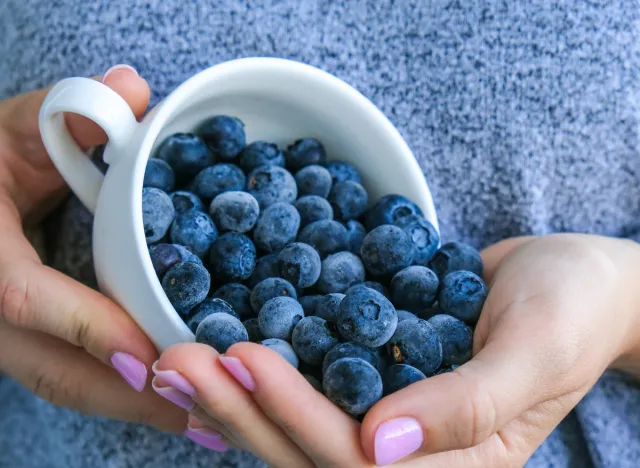
"Blueberries have emerged as one of the most beneficial foods for brain health," says Manaker. "These vibrant berries are rich in antioxidants, which are compounds that protect the brain from oxidative stress and inflammation, potentially slowing brain aging and boosting its communication capabilities."
Manaker adds that "Blueberries contain a high amount of flavonoids, particularly anthocyanins, which have been found to improve memory, cognition, and motor skills."
Also, in a recent study published in the American Journal of Clinical Nutrition, participants who consumed daily doses of wild blueberry powder saw improved memory and faster cognitive reaction time.
Pomegranate
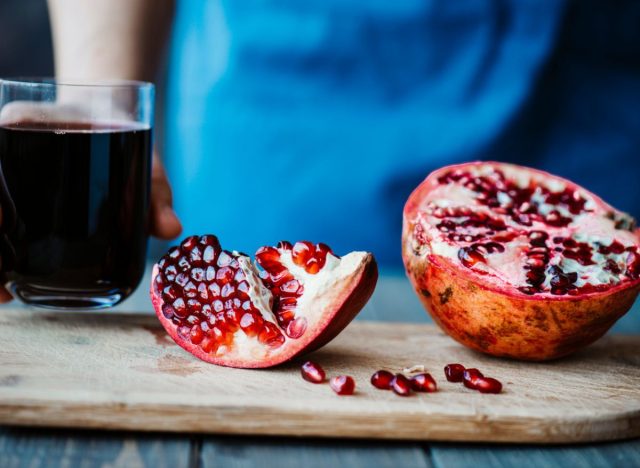
Another food to incorporate into your daily routine for an extra brain boost is pomegranate, "which is known as the 'jewel of winter' and holds significant potential for enhancing brain health," says Manaker. There are a handful of characteristics that make pomegranate so beneficial for the aging brain.
For starters, "This succulent fruit is packed with powerful antioxidants known as polyphenols, which are believed to offer neuroprotective effects," says Manaker. "These polyphenol antioxidants help to combat oxidative stress, a key contributor to neurodegenerative disorders like Alzheimer's and Parkinson's disease."
Along with polyphenols, pomegranates also contain a compound known as punicalagin, "which is believed to slow the progression of Alzheimer's disease and improve memory," adds Manaker.
Lastly, Manaker explains that "Pomegranates are a good source of dietary nitrates, which have been shown to improve blood flow to the brain and enhance cognitive function." A recent report published in Current Opinion in Clinical Nutrition and Metabolic Care says that even though some past research has found a link between nitrates and brain function, longer-term research is needed before recommending it as a treatment.
Oranges
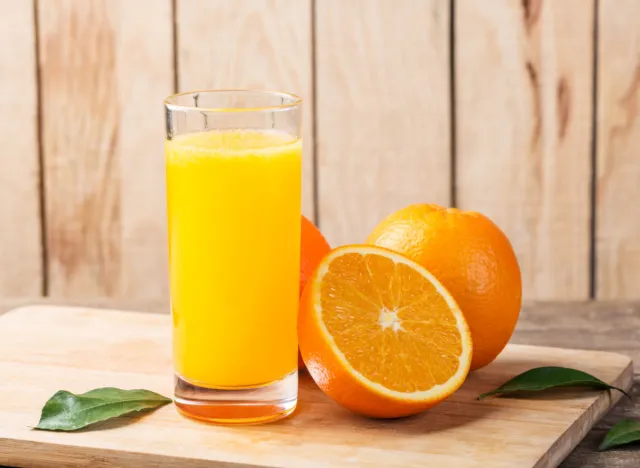
Whether you're eating some orange slices or drinking a glass of OJ, you'll be giving your brain a boost of helpful nutrients.
"The health benefits of oranges extend beyond its high vitamin C content, particularly in relation to brain health," says Manaker. "Oranges and orange juice are rich sources of flavonoids, which have been associated with reducing inflammation and restoring cellular function in the brain."
"Additionally, oranges are a source of folate, which may impact brain function as well," adds Manaker.
Walnuts
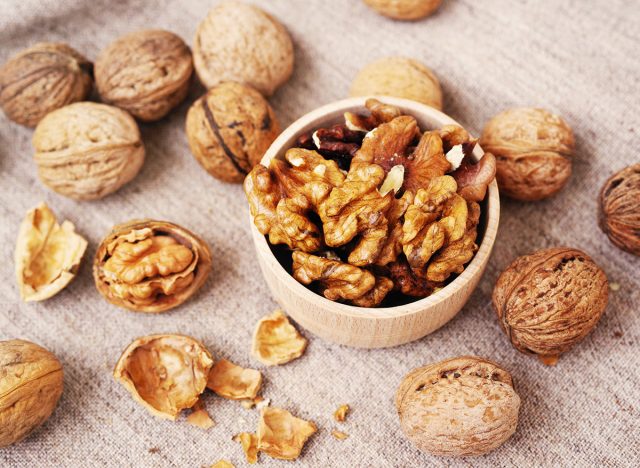
Manaker adds walnuts to the list of brain-healthy foods because "The nutrients in walnuts, including polyphenols, may play an important role in cognitive health," she says, "and scientific evidence suggests that including walnuts as part of a healthy diet may play a role in helping to maintain and improve cognitive health as people age."
More specifically, a report from The Journal of Nutrition says that the antioxidants in walnuts can help prevent oxidative stress and inflammation that is so commonly seen in older adults, and the existence of healthy fatty acids in walnuts can benefit the aging brain as well.
Manaker adds that walnuts also contain heart-healthy benefits, which can help with brain health, too.
"When it comes to brain health, heart health is important because the heart pumps blood to the brain so it can function properly," says Manaker. "Walnuts are a heart-healthy food with […] research showing how they may have beneficial effects on various factors related to heart health such as cholesterol, blood pressure, inflammation, and plaque formation."
So, enjoy a healthier heart and brain, and grab a handful of walnuts today.
Salmon
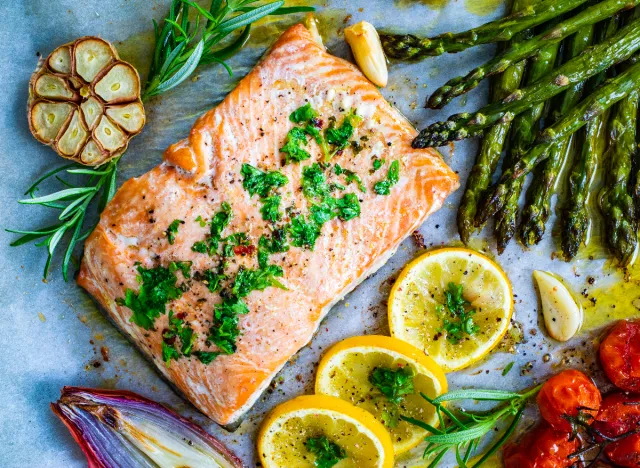
Salmon contains omega-3 fatty acids, which are polyunsaturated fatty acids that have been linked to a number of health benefits, including better brain health and cognitive function.
According to a report published in the journal Cureus, omega-3s were found to improve memory, learning, and "cognitive well-being."
Not only that, but the National Institutes of Health says that even though more research is needed, some studies have found that consuming more omega-3-rich foods may help lower the risk of developing Alzheimer's disease.
On top of being rich in omega-3 fatty acids, salmon also contains vitamin D—a nutrient that can help with cognition and brain health. Another report from Cureus describes how vitamin D can help older adults maintain regular cognitive functioning, and that there may be a link between vitamin D deficiency and the development of dementia.
Leafy Greens
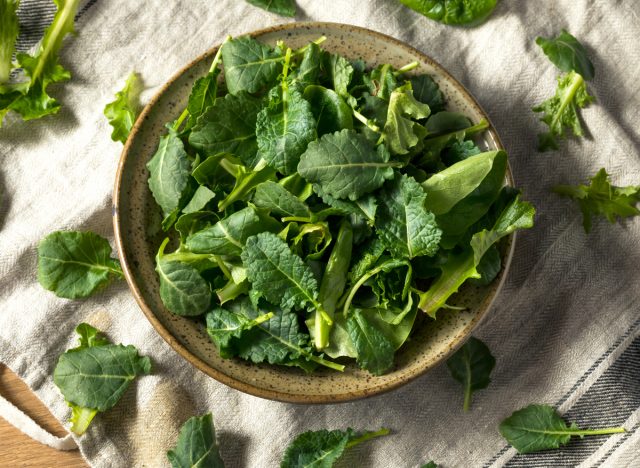
Kale, spinach, arugula, and bok choy are called "leafy greens," and these vegetables are known for packing a punch of different nutrients, including some that may help improve the health of your brain.
According to Harvard Health, leafy greens contain tons of folate, vitamin K, lutein, and beta-carotene, all of which have been linked to slowing the rate of cognitive decline. A study published in Neurology even found that just one serving of leafy greens per day was associated with slower age-related cognitive decline.
Eggs
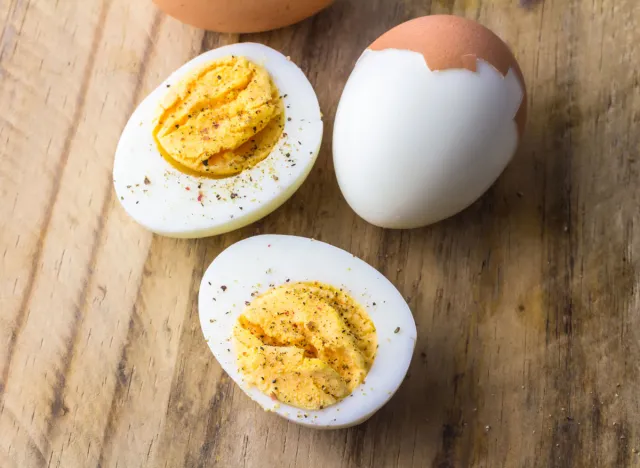
Eggs are good for more than just their protein content—they are also one of the most choline-rich foods you can eat. The daily value for choline is between 425 and 550 milligrams, and one egg contains 169 milligrams, but what is choline and what does it have to do with your brain health?
The National Institute of Health explains that your body needs choline for the regulation of your mood and your memory function, and a 2021 study published in Behavioural Neurology found that increased consumption of dietary choline reduced the risk of "low cognitive function" in elder adults.
A very recent report from Frontiers in Aging Neuroscience confirms that choline may be able to help delay cognitive decline in elderly populations, while a 2023 study from Lipids in Health and Disease found that participants 60 years of age or above who consumed choline specifically from egg yolks had improved "verbal memory," which is considered a main cognitive function.
Broccoli
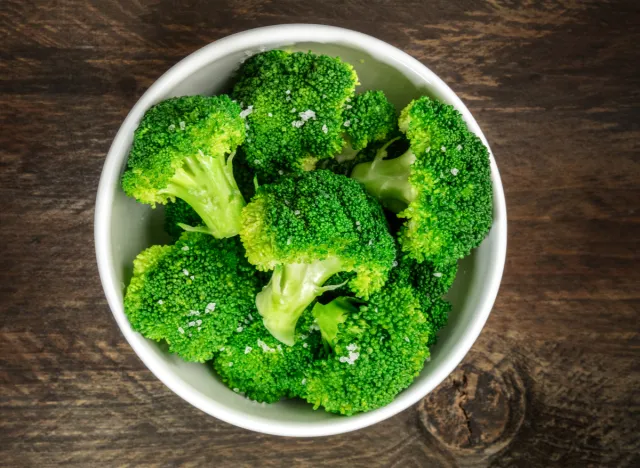
Broccoli is good for you in more ways than one, but a lesser-known benefit of broccoli is the fact that it contains more than your daily value of vitamin K: a vitamin that is directly linked to better brain health.
A 2020 study found that elderly participants between the ages of 75 and 92 saw a positive correlation between vitamin K intake and the status of their cognitive function.
One study from the Alzheimer's Association concluded that higher intakes of vitamin K were linked to slower rates of age-related cognitive decline.
If broccoli's levels of vitamin K weren't convincing enough, this green vegetable is also extremely high in sulforaphane—a compound found in cruciferous vegetables like cauliflower, bok choy, and broccoli that has been linked to brain benefits as well.
A 2019 study published in Brain Circulation found that sulforaphane may help fight inflammation and may also have neuroprotective qualities. Another study found that sulforaphane was able to help improve the cognitive function of those who experienced frontal brain damage.
Sardines
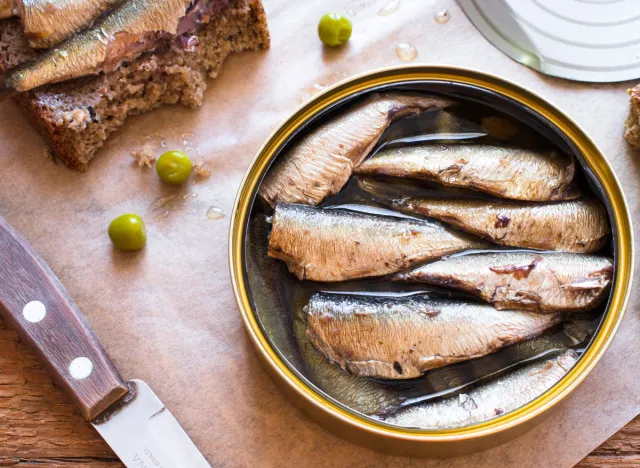
If you're growing tired of canned tuna and want a fish that is a bit more flavorful and less dry, switching to canned sardines can be a good choice.
Not only are canned sardines packed with healthy omega-3 fatty acids—which have been linked to better brain health, especially in middle-aged adults, but sardines also contain 48% of your daily value of vitamin D, which is another nutrient that can help you improve the functioning of your cognitive health as you get older.
Turmeric
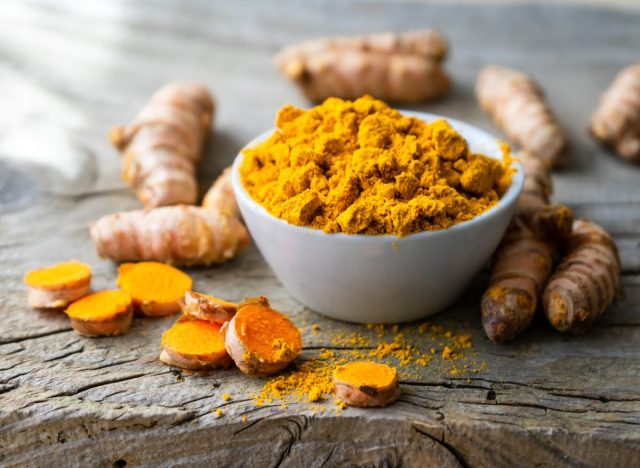
Grab yourself a golden latte and enjoy the brain-boosting benefits that it has to offer. Various animal studies have shown that curcumin—the main active ingredient in turmeric—may be able to protect against the development of Alzheimer's disease. One study also found that curcumin may be beneficial in reducing amyloid plaque—which is made up of proteins that clump together and have been linked to the development of Alzheimer's.
Other research has found that curcumin can help fight oxidative stress and inflammation related to age-related cognitive decline, making this compound helpful in improving your brain health as you age.
- Source: https://www.ncbi.nlm.nih.gov/pmc/articles/PMC7153285/#:~:text=Approximately%20two%20out%20of%20three,age%20of%20approximately%2070%20years.
- Source: https://www.sciencedirect.com/science/article/pii/S2161831322000187#:~:text=The%20dampening%20effects%20of%20blueberry,(ROS)%20and%20lipid%20peroxidation.
- Source: https://www.ncbi.nlm.nih.gov/pmc/articles/PMC7696928/
- Source: https://ajcn.nutrition.org/article/S0002-9165(23)46300-9/fulltext
- Source: https://www.ncbi.nlm.nih.gov/pmc/articles/PMC4477247/#:~:text=Pomegranate%20also%20contains%20other%20polyphenols,L%20juice)%20%5B9%5D.
- Source: https://www.sciencedirect.com/science/article/abs/pii/S014976342100302X#:~:text=One%20of%20the%20main%20mechanisms,1).
- Source: https://www.ncbi.nlm.nih.gov/pmc/articles/PMC8945272/
- Source: https://www.ncbi.nlm.nih.gov/pmc/articles/PMC8308219/
- Source: https://www.sciencedirect.com/science/article/pii/S0002916523639516
- Source: https://journals.lww.com/co-clinicalnutrition/abstract/2022/11000/dietary_nitrate,_aging_and_brain_health__the.5.aspx
- Source: https://fdc.nal.usda.gov/fdc-app.html#/food-details/169918/nutrients
- Source: https://www.sciencedirect.com/science/article/pii/S0753332218346845
- Source: https://www.ncbi.nlm.nih.gov/pmc/articles/PMC9742231/
- Source: https://www.ncbi.nlm.nih.gov/pmc/articles/PMC7071526/#:~:text=The%20difference%20in%20cognition%20scores,two%20years%20of%20cognitive%20aging.
- Source: https://www.sciencedirect.com/science/article/pii/S0022316622008604
- Source: https://www.ncbi.nlm.nih.gov/pmc/articles/PMC5762129/
- Source: https://www.ahajournals.org/doi/10.1161/CIRCULATIONAHA.121.054051
- Source: https://www.ahajournals.org/doi/full/10.1161/HYPERTENSIONAHA.118.12766
- Source: https://www.ncbi.nlm.nih.gov/pmc/articles/PMC9609811/
- Source: https://pubmed.ncbi.nlm.nih.gov/23347681/
- Source: https://fdc.nal.usda.gov/fdc-app.html#/food-details/175167/nutrients
- Source: https://www.ncbi.nlm.nih.gov/pmc/articles/PMC9641984/
- Source: https://ods.od.nih.gov/factsheets/Omega3FattyAcids-Consumer/
- Source: https://www.ncbi.nlm.nih.gov/pmc/articles/PMC6132681/
- Source: https://www.health.harvard.edu/healthbeat/foods-linked-to-better-brainpower
- Source: https://n.neurology.org/content/90/3/e214
- Source: https://ods.od.nih.gov/factsheets/Choline-Consumer/
- Source: https://fdc.nal.usda.gov/fdc-app.html#/food-details/748967/nutrients
- Source: https://ods.od.nih.gov/factsheets/Choline-Consumer/
- Source: https://www.ncbi.nlm.nih.gov/pmc/articles/PMC8570899/
- Source: https://www.frontiersin.org/articles/10.3389/fnagi.2023.1242853/full
- Source: https://www.frontiersin.org/articles/10.3389/fnagi.2023.1242853/full
- Source: https://fdc.nal.usda.gov/fdc-app.html#/food-details/170379/nutrients
- Source: https://www.hindawi.com/journals/jar/2020/9695324/
- Source: https://alz-journals.onlinelibrary.wiley.com/doi/full/10.1002/trc2.12255
- Source: https://www.ncbi.nlm.nih.gov/pmc/articles/PMC6611193/
- Source: https://bmjopen.bmj.com/content/10/10/e037543
- Source: https://n.neurology.org/content/99/23/e2572
- Source: https://fdc.nal.usda.gov/fdc-app.html#/food-details/175139/nutrients
- Source: https://www.ncbi.nlm.nih.gov/pmc/articles/PMC6132681/
- Source: https://pubmed.ncbi.nlm.nih.gov/29332042/
- Source: https://pubmed.ncbi.nlm.nih.gov/31640096/
- Source: https://www.ncbi.nlm.nih.gov/pmc/articles/PMC5964053/









